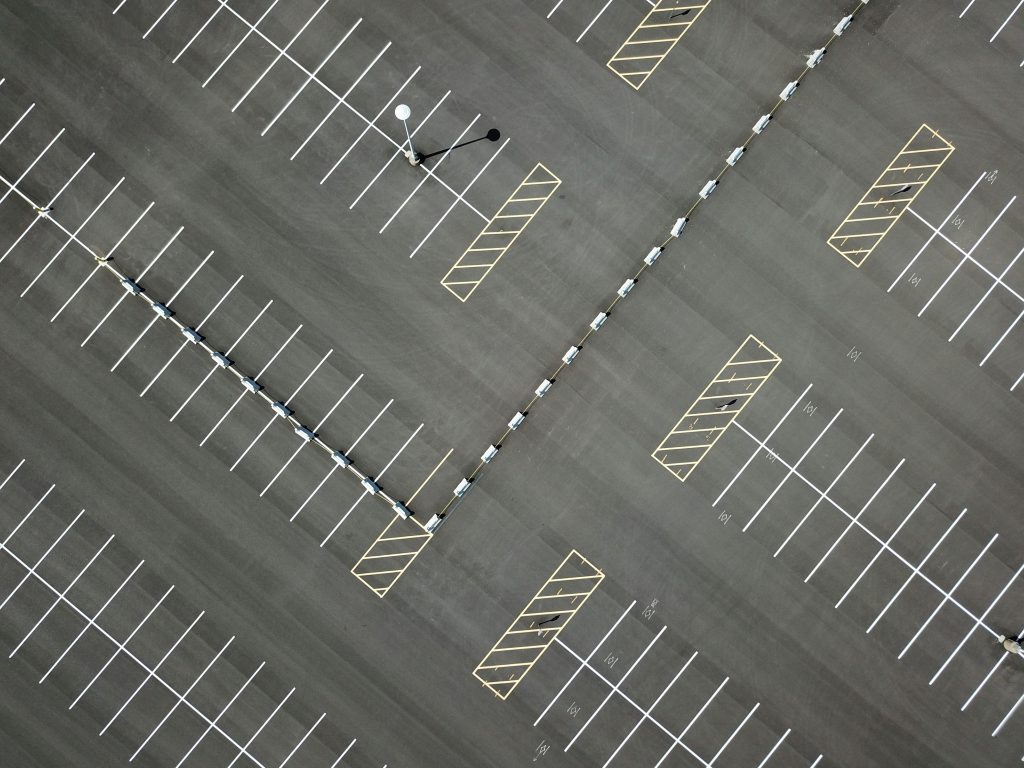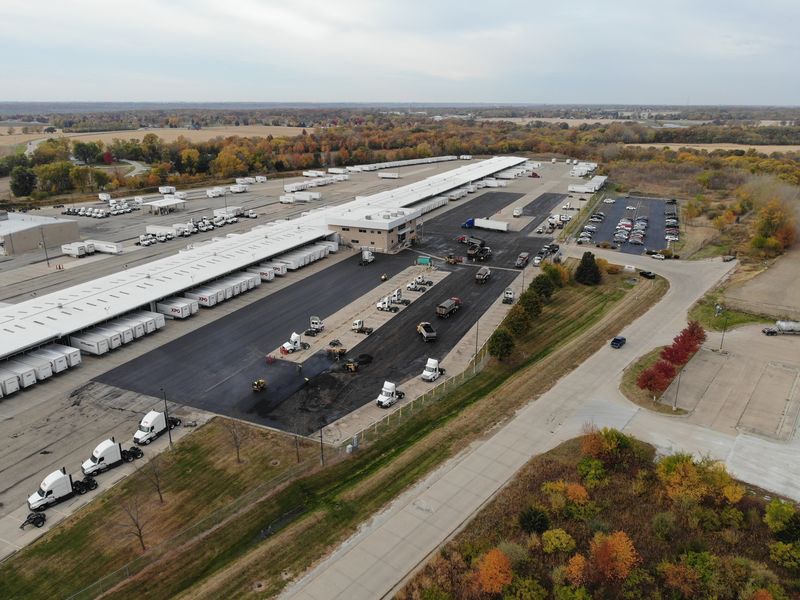When you’re managing a commercial property or an industrial site, your pavement isn’t just asphalt; it’s a significant investment in paving and surface solutions. Whether it’s a parking lot, driveway, or industrial-grade surface, these areas serve critical roles in safety, traffic flow, and your property’s first impression.
At The Pavement Group, we help businesses like yours plan, build, and maintain pavement assets with long-term value in mind. With locations serving Pittsburgh, Philadelphia, Columbus, and other cities across the country, we bring expert solutions backed by real data and smarter planning.
Let’s break down what makes each type of paving project unique and how you can get the most out of your investment.
What Are Commercial Parking Lots?
Commercial parking lots are more than just places to park. They are your customer’s first impression and one of the most used parts of your property.
They also take a beating from cars, trucks, weather, and foot traffic. That means the materials and methods used need to be tough, safe, and designed to last.
Common Features in Commercial Parking Lots
- Durable asphalt or concrete surfaces
- Proper drainage systems
- Striping and signage
- ADA-compliant access points
- Speed bumps and stop bars
- Curbs and landscaping
A poorly built lot can lead to accidents, poor customer experience, and expensive repairs. That’s why planning matters.
The Pavement Group Approach
We use data-driven tools to evaluate your lot’s condition and recommend the best solutions. Our team can also help you plan sealcoating, crack sealing, or overlays based on lifecycle cost, not just quick fixes.
What Makes Commercial Driveways Different?
Driveways in commercial settings do more than connect to the road. They often serve delivery zones, customer access lanes, and employee routes. These areas face high traffic volume and sometimes heavy trucks.
That’s a big difference from residential driveways.
Design Considerations for Commercial Driveways
- Thicker pavement layers to support weight
- Wider turning areas for delivery trucks
- Reinforced edges to prevent cracking
- Clear directional signage
- Integrated lighting or security features
Poorly designed driveways can cause backups, delivery delays, and even accidents. That’s why we always customize layouts to your business operations.
What Is Industrial Paving?
Industrial paving involves surfaces built for warehouses, factories, loading docks, and other heavy-duty spaces. These are high-impact areas that need to handle forklifts, trailers, and constant wear and tear.
It’s not just paving, it’s performance under pressure.
Where You’ll Find Industrial Paving
- Distribution centers
- Manufacturing plants
- Shipping hubs
- Utility companies
- Mining and energy sites
These areas often require thicker sub-bases, specialized concrete mixes, and slope design for water runoff. Industrial paving isn’t a one-size-fits-all job.
The Pavement Group’s Proven Process
We don’t just throw asphalt on the ground. We use a proprietary process that includes:
- Pavement condition assessment
- Strategic repair and maintenance planning
- Lifecycle cost forecasting
- Real-time project tracking
- Multi-site portfolio management
Whether you have one property or a dozen across different states, we keep you informed every step of the way.
Testimonial from Columbus, Ohio
“Our facility needed loading dock upgrades and our lot had drainage issues for years. The Pavement Group not only fixed the problems, they gave us a 5-year maintenance plan and saved us from major costs down the road.”
— Darren H., Operations Manager, Columbus OH
Cost Considerations in Commercial and Industrial Paving
Every paving project has different needs, and the cost can vary based on size, materials, and condition.
We help you look at the total cost of ownership, not just the initial cost—so you can stretch your budget while keeping your pavement safe and functional.
What Impacts Cost?
- Square footage
- Material type (asphalt vs concrete)
- Drainage requirements
- Grading or excavation
- Labor and timelines
- Local city regulations
We also help you plan around your business hours to avoid disruptions.
Get Smarter Pavement Solutions with The Pavement Group
Don’t let cracks, potholes, or drainage issues cause damage or downtime. Call The Pavement Group today for a consultation. We’ll walk your property, evaluate your pavement, and help you build a plan that saves money and adds value.
Frequently Asked Questions
1. What’s the difference between commercial and residential paving?
Commercial paving handles heavier traffic and larger surface areas than residential paving. It uses stronger materials and deeper sub-bases. It also requires more planning for safety and compliance.
2. How often should a commercial parking lot be sealed?
Sealcoating should be done every 2 to 3 years. It helps protect the surface from water, oil, and UV damage. Regular sealing extends the life of your pavement.
3. What materials are best for industrial paving?
Asphalt and reinforced concrete are both common. Concrete is ideal for heavy loads while asphalt is more flexible. Your choice depends on usage, weight, and budget.
4. Can you repair just part of a parking lot?
Yes, you can perform partial repairs like patching or overlays. This is a cost-effective option for damaged sections. We assess your lot to recommend targeted repairs.
5. Why is drainage important in commercial paving?
Poor drainage causes pooling, potholes, and faster deterioration. We design slopes and catch basins to move water away. Good drainage protects your investment.
6. Do you need permits for commercial paving in cities like Pittsburgh or Philly?
Yes, most cities require permits for paving. We handle all local requirements for you. This includes inspections and zoning compliance.
7. What’s the average lifespan of industrial pavement?
With proper maintenance, industrial pavement can last 20 to 30 years. Factors like traffic, weather, and materials play a role. Maintenance planning keeps it in good shape.
8. How can I tell if my lot needs resurfacing?
Look for cracks, fading, and standing water. If patching no longer helps, resurfacing may be needed. We offer pavement assessments to determine the best fix.
9. Is concrete better than asphalt for commercial lots?
Concrete lasts longer but costs more upfront. Asphalt is cheaper and easier to repair. The best choice depends on your traffic and budget.
10. Does The Pavement Group offer multi-site paving management?
Yes, we work with property managers across multiple locations. We create a unified plan for budgeting, repairs, and maintenance. Our digital tools make tracking easy.


